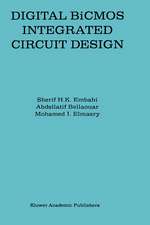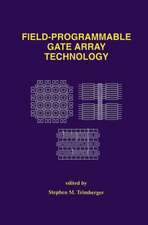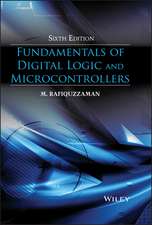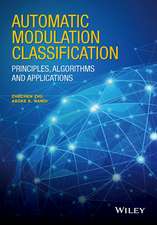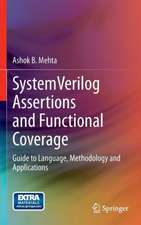Software Defined Radios: From Smart(er) to Cognitive: Signals and Communication Technology
Autor Sofie Pollin, Michael Timmers, Liesbet Van der Perreen Limba Engleză Paperback – 29 mai 2013
It is crucial to manage the new degrees of freedom opened up in radios and standards in a smart way, such that the required service is offered at satisfactory quality as efficiently as possible. Efficiency in energy consumption is clearly primordial for battery powered mobile terminals specifically, and in the context of growing ecological concerns in a broader context. Moreover, efficient usage of the spectrum is a growing prerequisite for wireless systems, and coexistence of different standards puts overall throughput at risk.
The management of flexibility risks bringing about intolerable complexity and hamper the desired agility. A systematic approach, consisting of anticipative preparing for smooth operation, allows mastering this challenge. Case studies show that already today, this approach enables smart operation of radios realizing impressive efficiency gains without hampering Quality-of-Service. In the future wireless communication scenes will be able to profit form the opening of the spectrum. Even smarter and cognitive behavior will become possible and essential.
| Toate formatele și edițiile | Preț | Express |
|---|---|---|
| Paperback (1) | 633.68 lei 6-8 săpt. | |
| SPRINGER NETHERLANDS – 29 mai 2013 | 633.68 lei 6-8 săpt. | |
| Hardback (1) | 640.06 lei 6-8 săpt. | |
| SPRINGER NETHERLANDS – 6 mai 2011 | 640.06 lei 6-8 săpt. |
Din seria Signals and Communication Technology
- 18%
 Preț: 952.89 lei
Preț: 952.89 lei - 18%
 Preț: 1559.80 lei
Preț: 1559.80 lei - 17%
 Preț: 361.80 lei
Preț: 361.80 lei - 18%
 Preț: 811.61 lei
Preț: 811.61 lei - 15%
 Preț: 585.26 lei
Preț: 585.26 lei - 18%
 Preț: 727.97 lei
Preț: 727.97 lei - 15%
 Preț: 585.90 lei
Preț: 585.90 lei -
 Preț: 393.35 lei
Preț: 393.35 lei - 20%
 Preț: 1002.73 lei
Preț: 1002.73 lei - 15%
 Preț: 641.71 lei
Preț: 641.71 lei - 20%
 Preț: 338.92 lei
Preț: 338.92 lei - 18%
 Preț: 1579.66 lei
Preț: 1579.66 lei - 18%
 Preț: 896.08 lei
Preț: 896.08 lei - 18%
 Preț: 847.11 lei
Preț: 847.11 lei - 18%
 Preț: 1234.77 lei
Preț: 1234.77 lei - 18%
 Preț: 905.54 lei
Preț: 905.54 lei - 15%
 Preț: 646.43 lei
Preț: 646.43 lei - 20%
 Preț: 662.48 lei
Preț: 662.48 lei - 15%
 Preț: 641.20 lei
Preț: 641.20 lei - 18%
 Preț: 1847.84 lei
Preț: 1847.84 lei - 18%
 Preț: 946.24 lei
Preț: 946.24 lei - 18%
 Preț: 1241.10 lei
Preț: 1241.10 lei - 20%
 Preț: 649.43 lei
Preț: 649.43 lei - 20%
 Preț: 993.28 lei
Preț: 993.28 lei - 18%
 Preț: 940.57 lei
Preț: 940.57 lei - 18%
 Preț: 1389.30 lei
Preț: 1389.30 lei - 20%
 Preț: 1003.50 lei
Preț: 1003.50 lei - 18%
 Preț: 953.52 lei
Preț: 953.52 lei - 20%
 Preț: 1001.16 lei
Preț: 1001.16 lei - 18%
 Preț: 1415.36 lei
Preț: 1415.36 lei - 15%
 Preț: 653.33 lei
Preț: 653.33 lei - 15%
 Preț: 645.60 lei
Preț: 645.60 lei - 15%
 Preț: 637.28 lei
Preț: 637.28 lei - 18%
 Preț: 948.79 lei
Preț: 948.79 lei - 18%
 Preț: 945.62 lei
Preț: 945.62 lei - 18%
 Preț: 836.36 lei
Preț: 836.36 lei - 18%
 Preț: 1225.46 lei
Preț: 1225.46 lei - 15%
 Preț: 635.01 lei
Preț: 635.01 lei - 15%
 Preț: 639.25 lei
Preț: 639.25 lei - 15%
 Preț: 646.30 lei
Preț: 646.30 lei - 15%
 Preț: 639.25 lei
Preț: 639.25 lei - 15%
 Preț: 712.36 lei
Preț: 712.36 lei - 20%
 Preț: 1006.12 lei
Preț: 1006.12 lei - 18%
 Preț: 970.56 lei
Preț: 970.56 lei
Preț: 633.68 lei
Preț vechi: 745.50 lei
-15% Nou
Puncte Express: 951
Preț estimativ în valută:
121.27€ • 126.14$ • 100.12£
121.27€ • 126.14$ • 100.12£
Carte tipărită la comandă
Livrare economică 14-28 aprilie
Preluare comenzi: 021 569.72.76
Specificații
ISBN-13: 9789400735972
ISBN-10: 9400735979
Pagini: 160
Ilustrații: XX, 140 p.
Dimensiuni: 155 x 235 x 8 mm
Greutate: 0.23 kg
Ediția:2011
Editura: SPRINGER NETHERLANDS
Colecția Springer
Seria Signals and Communication Technology
Locul publicării:Dordrecht, Netherlands
ISBN-10: 9400735979
Pagini: 160
Ilustrații: XX, 140 p.
Dimensiuni: 155 x 235 x 8 mm
Greutate: 0.23 kg
Ediția:2011
Editura: SPRINGER NETHERLANDS
Colecția Springer
Seria Signals and Communication Technology
Locul publicării:Dordrecht, Netherlands
Public țintă
ResearchCuprins
1. Serving Many Mobile Users in Various Scenarios: Radios to Go Smart(er) and Cognitive.- 2. Emerging Standards for Smart Radios: Enabling Tomorrow's Operation.- 3. Cognitive Radio Design and Operation: Mastering the Complexity in a Systematic Way.- 4. Distributed Monitoring for Opportunistic Radios.- 5. Coexistence: the Whole is Greater than the Sum of Its Parts.- 6. Anticipative Energy and QoS Management: Systematically Improving the User Experience.- 7. Distributed Optimization of Local Area Networks.- 8. Close.- Bibliography.
Recenzii
From the reviews:
“The monograph is intended for researchers advanced in wireless network design and optimization. For those interested in the concepts of wireless coexistence, this book will be a valuable source of information. The work is cohesive … . It is also compact and easy to read, especially for people familiar with advanced wireless communications concepts. … it is certainly worth reading―many practical and novel coexistence concepts are introduced therein. It will form a source of inspiration for further research in the area.” (Przemyslaw Pawelczak, IEEE Communications Magazine, August, 2011)
“The monograph is intended for researchers advanced in wireless network design and optimization. For those interested in the concepts of wireless coexistence, this book will be a valuable source of information. The work is cohesive … . It is also compact and easy to read, especially for people familiar with advanced wireless communications concepts. … it is certainly worth reading―many practical and novel coexistence concepts are introduced therein. It will form a source of inspiration for further research in the area.” (Przemyslaw Pawelczak, IEEE Communications Magazine, August, 2011)
Notă biografică
Sofie Pollin obtained the M.Sc. degree in Electrical Engineering Degree in 2002 and the PhD Degree in Electrical Engineering (with honors) in 2006 from the Katholieke Universiteit Leuven, Belgium. From 2002 to 2006 she was a researcher at the Wireless Research group of the Inter-university Microelectronics Center (IMEC) working on cross-layer energy and performance optimization of wireless systems. From 2005 till 2008 she was a post-doctoral researcher at UC Berkeley working on Cognitive Radio. Currently, she is a senior researcher at IMEC, leading the work on functionality and cognitive behavior of reconfigurable radios.
Michael Timmers received the M. Sc. Degree in Electrical Engineering and the Ph.D. degree from the K.U.Leuven, Belgium, in 2005 and 2009, respectively. In September 2005, he joined the TELEMIC division of the Department of Electrical Engineering of K.U.Leuven, where he mainly focused on the application of radio waves in biomedical technology. In March 2006, he joined IMEC to pursue a PhD degree in the field of Cognitive Radio. He was a visiting scholar at the Connectivity Lab at U.C. Berkeley in the summer of 2007. His doctoral thesis focuses on distributed medium access control, Software Defined Radio, Opportunistic Spectrum Access and Cognitive Radio.
Liesbet Van der Perre received the M.Sc. degree in Electrical Engineering and the PhD degree from the K.U.Leuven, Belgium, in 1992 and 1997 respectively.
Her work in the past focused on radio propagation modelling, system design and digital modems for high-speed wireless communications. She was a system architect in IMECs OFDM ASICs development. Consequently, she was the project leader for IMEC's low power Turbo codec. From 2005 till 2008 she was the scientific director of wireless research group in IMEC and the project leader for the digital baseband Software Defined Radio, and a public speaking coach for IMEC staff.
Currently, she is program director for IMEC's green radio program, comprising the cognitive reconfigurable radios and mm-wave communications. Liesbet is a part-time professor at the K.U.Leuven, Belgium, since 2008. She is an author and co-author of over 200 scientific publications published in conference proceedings, journals, and books.
Michael Timmers received the M. Sc. Degree in Electrical Engineering and the Ph.D. degree from the K.U.Leuven, Belgium, in 2005 and 2009, respectively. In September 2005, he joined the TELEMIC division of the Department of Electrical Engineering of K.U.Leuven, where he mainly focused on the application of radio waves in biomedical technology. In March 2006, he joined IMEC to pursue a PhD degree in the field of Cognitive Radio. He was a visiting scholar at the Connectivity Lab at U.C. Berkeley in the summer of 2007. His doctoral thesis focuses on distributed medium access control, Software Defined Radio, Opportunistic Spectrum Access and Cognitive Radio.
Liesbet Van der Perre received the M.Sc. degree in Electrical Engineering and the PhD degree from the K.U.Leuven, Belgium, in 1992 and 1997 respectively.
Her work in the past focused on radio propagation modelling, system design and digital modems for high-speed wireless communications. She was a system architect in IMECs OFDM ASICs development. Consequently, she was the project leader for IMEC's low power Turbo codec. From 2005 till 2008 she was the scientific director of wireless research group in IMEC and the project leader for the digital baseband Software Defined Radio, and a public speaking coach for IMEC staff.
Currently, she is program director for IMEC's green radio program, comprising the cognitive reconfigurable radios and mm-wave communications. Liesbet is a part-time professor at the K.U.Leuven, Belgium, since 2008. She is an author and co-author of over 200 scientific publications published in conference proceedings, journals, and books.
Textul de pe ultima copertă
Mobile users need a variety of multimedia services, in very diverse geographical environments. The growing number of communication options within and across wireless standards is accommodating the growing volume and heterogeneity in wireless demands. On the other hand, advancement in radio technologies opening much more flexibility, a.o. through Software Defined Radios, opens up the possibility to realize mobile devices featuring multi-mode options at low cost and interesting form factors.
It is crucial to manage the new degrees of freedom opened up in radios and standards in a smart way, such that the required service is offered at satisfactory quality, as efficiently as possible. Efficiency in energy consumption is paramount for battery powered mobile terminals, as well as in a broader, ecological context. Moreover, efficient usage of the spectrum is a growing prerequisite for wireless systems, and coexistence of different standards puts overall throughput at risk.
The management of flexibility risks entails complexity which hampers the desired system agility. This book describes a systematic approach to master this challenge. Case studies show that this approach enables smart operation of radios realizing impressive efficiency gains, without hampering Quality-of-Service.
It is crucial to manage the new degrees of freedom opened up in radios and standards in a smart way, such that the required service is offered at satisfactory quality, as efficiently as possible. Efficiency in energy consumption is paramount for battery powered mobile terminals, as well as in a broader, ecological context. Moreover, efficient usage of the spectrum is a growing prerequisite for wireless systems, and coexistence of different standards puts overall throughput at risk.
The management of flexibility risks entails complexity which hampers the desired system agility. This book describes a systematic approach to master this challenge. Case studies show that this approach enables smart operation of radios realizing impressive efficiency gains, without hampering Quality-of-Service.
- Provides a concise overview of software defined radio technologies, opportunistic spectrum access and wireless standards; introduces opportunities and challenges related to the smart operation of radios in this context.
- Proposes a systematic approach to master the complexity of the desired agility.
- Demonstrates the application and benefits of this approach in recent systems, e.g. in WiFi context, and in the context of coexistence of different systems.
- Shows the need and potential in future scenarios, where cognitive radios will operate in an open spectrum environment.
Caracteristici
Brings a concise overview of the recent background and context of wireless standards Specifically introduces opportunities and challenges Proposes a systematic approach Demonstrates the application and benefits of this approach in recent systems, e.g. in WiFi Shows the need and potential in future scenarios Includes supplementary material: sn.pub/extras





